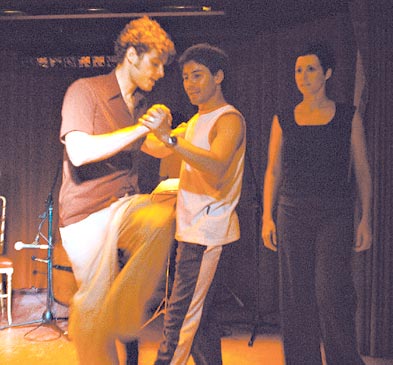 BUENOS AIRES - Gay tango classes and same-sex unions may not be mentioned in every guidebook, but such attractions are turning Buenos Aires into a new South American mecca for gay travellers.
BUENOS AIRES - Gay tango classes and same-sex unions may not be mentioned in every guidebook, but such attractions are turning Buenos Aires into a new South American mecca for gay travellers.A port city of 3 million people, Buenos Aires has never had trouble luring tourists with its European-style elegance, historic neighbourhoods and reputation for beautiful people.
But more and more of its visitors are gay, mostly men, who through word of mouth or advertising hear about the city's vibrant circuit where "out" men and women are an accepted part of urban life.
Martin Oortwyn, a 50 year old in the software business, landed in the city in mid-February from the Netherlands.
"I went to some gay bars yesterday. It is like wherever in Europe. It could be Amsterdam, London, it could be Madrid. Very fashionable," he said.
As Argentina recovers from an economic crisis and the leisure industry revives, Buenos Aires is cultivating its image as a Latin American rebel that embraces the social values of Europe more than macho culture and Roman Catholic doctrine.
Last year, the number of tourists in Buenos Aires surged 38 per cent as Europeans and North Americans took advantage of a favourable exchange rate that makes everything from barbecues to operas at the grandiose Teatro Colon dirt cheap.
Morals aside, gay and lesbian tourism is also very lucrative. Argentina wants to grab a bigger slice of the estimated $US94 billion ($NZ127 billion) in annual revenue the niche market generates worldwide, according to the International Gay and Lesbian Travel Association, IGLTA.
That's why the group chose Buenos Aires as the site for its annual symposium in late February where it coached 109 tour operators from 10 countries on how to get in on this booming new business.
"It's an extremely large and profitable niche market that brings in travel receipts in excess of $55 billion out of America only, with research producing a figure of around $94 billion worldwide," said Robert Wilson, executive director of IGLTA.
There are no official statistics on gay and lesbian travellers to Buenos Aires, but tourism officials estimate that one in five of the 5.25 million visitors last year was gay.
They are a high-end segment because they usually have no children and therefore spend more on themselves.
The Buenos Aires city government proudly touts the metropolis as "South America's most important destination for gay travellers" on its Web site.
The claim does not seem far-fetched to anyone who has strolled through the trendy district of Palermo or done the gay circuit of restaurants and tango bars in the historic neighbourhood of San Telmo.
Plus, the city legalized same-sex unions in 2003, becoming the first South American city to do so.
Carlos Melia, owner of Pride Travel, which serves some 30 gay clients a month, said they are increasingly opting for the more refined and discreet Buenos Aires over Brazil's Rio de Janeiro, whose beaches and party atmosphere have made it a traditional gay hangout.
But Swedish waiter Kay Jeanson, 35, said the gay scene in Argentina was slightly dated. "I saw drag shows and strippers and stuff, that happened in Sweden maybe 10 or 15 years ago. We're in 2005 now. Been there, done that," he said.
Like Oortwyn and some other guests at a bed and breakfast for gay men, Jeanson said the nightlife was not the main attraction but it was important for gauging how welcoming the place would be to homosexuals before booking tickets.
There are seven tourist agencies and hotels in Buenos Aires that cater exclusively to gays and dozens who bill themselves as "gay friendly" in their brochures and Web sites.
Real estate agent Iuri Irastzoff says he now sells 10 properties a year to foreign gay buyers thanks to a "guerrilla marketing strategy" targeting them.
Jason Mitchell of Britain settled here two years ago and sees a chance to make profits on this trend. "I think there is room for more gay bars and restaurants to open."
Peru, Ecuador and Uruguay are also arousing the interest of gay and lesbian travellers – or G&L tourists, as they are called in the industry – as South America slowly sheds its macho mentality to accept sexual diversity.
"These are emerging countries for the G and L market. The people are joining the social revolution, they are recognizing same-sex unions to varying degrees and Argentina has always been at the forefront of that," Mitchell said.
from Bamderas News
No comments:
Post a Comment